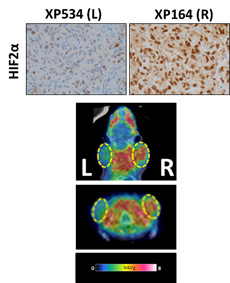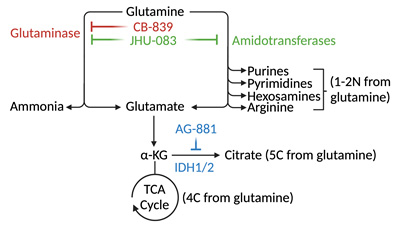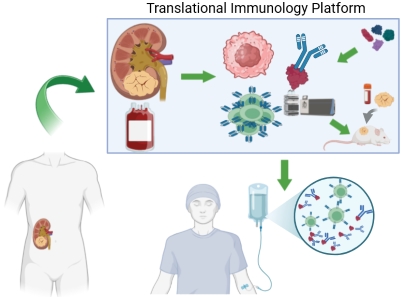University of Texas Southwestern Medical Center SPORE in Kidney Cancer
University of Texas Southwestern Medical Center
Principal Investigator(s):

James Brugarolas, MD, PhD

Payal Kapur, MD
- Principal Investigators Contact Information
- Overview
- Project 1: Targeting HIF2 in Renal Cell Carcinoma
- Project 2: Defining Targetable Metabolic Dependencies in Human Renal Cell Carcinoma
- Project 4: Translational Immunology Platform for Biomarker Prediction and Immunotherapy Development
- Biospecimen and Pathology Resources Core
- Data Analytics Core
- Translational Imaging Core
- Developmental Research Program
- Career Enhancement Program
Principal Investigators Contact Information
James Brugarolas, MD, PhD
Director, Kidney Cancer Program
Professor, Department of Internal Medicine, Hematology-Oncology Division
Cancer Biology, Genetics, Development & Disease
Sherry Wigley Crow Endowed Chair in CA Research
University of Texas Southwestern Medical Center
5323 Harry Hines Blvd.
Dallas, TX 75233
Tel: 214-648-4059
Payal Kapur, MD
Director, Genitourinary Pathology
Professor, Department of Pathology & Urology
Brock Fund for Medical Science Chair in Pathology
Jan and Bob Pickens Distinguished Professorship in Medical Science
University of Texas Southwestern Medical Center
5323 Harry Hines Blvd.
Dallas, TX 75233
Tel: 214-633-6363
Overview
Kidney cancer is expected to be diagnosed in over 75,000 individuals in the US in 2022 and is particularly prevalent in Texas. Approximately 30% of patients develop metastatic disease, and while survival rates are improving, still today most patients succumb to their disease. To address this unmet medical need, the UT Southwestern Medical Center Kidney Cancer SPORE has developed a comprehensive program to explore and translate therapeutic opportunities in three major areas: oncogenic pathways, metabolism, and immunology.
Project 1: Targeting HIF2 in Renal Cell Carcinoma
Project 2: Defining Targetable Metabolic Dependencies in Human Renal Cell Carcinoma
Project 3: Maximizing Anti-tumor Activity through Simultaneous Activation of the Innate and Adaptive Immune System in Kidney Cancer
Expanding the reach are a Career Enhancing Program with a minority award and a Developmental Research Program. A forward-looking Administrative Core serves as a hub. A Pathology Core brings to bear one of the largest and most sophisticated RCC tumor banks and expertise supporting international efforts. A Data Analytics Core assists with statistical support, bioinformatics, and data management with an avant-garde tool that automatically extracts information from the electronic medical record and links this information to experimental genomics and the tumor bank. An Imaging Core delivers enabling technologies, including innovative IND-holding radiotracers, and unparalleled expertise. Building upon the Simmons Comprehensive Cancer Center Kidney Cancer Program and its history of collaborative, interdisciplinary cancer research, SPORE Projects and Cores provide an engine of discovery, innovation, and translation supporting national and international efforts to advance patient care, research, and education.
Project 1: Targeting HIF2 in Renal Cell Carcinoma
Project Co-Leaders:
James Brugarolas, MD, PhD (Clinical Project Co-Leader)
Xiankai Sun, PhD (Basic Project Co-Leader)
Hypoxia-inducible factor 2α (HIF2α) is arguably the most important driver of kidney cancer. Discovered at UT Southwestern Medical Center (UTSW) and regarded as undruggable, structural studies revealed a vulnerability that was exploited through a chemical screen leading to the identification of small molecule inhibitors. The discovery of these inhibitors led to the founding of a biotech company hosted in the UTSW BioCenter, Peloton Therapeutics, Inc., which developed several analogues (PT2385, PT2399 and PT2977). During the previous funding cycle, we showed that PT drugs disable HIF2 in kidney cancer preclinical models, as well as in patients, and identified molecular mechanisms of resistance. The success of the program culminated the vertical collaboration with the acquisition of Peloton Therapeutics by Merck and approval by the FDA of a first-in-class HIF2α antagonist, PT2977 (also called belzutifan). During the next funding period, we will focus on the development of second-generation inhibitors as well as molecular imaging probes that can be deployed as predictive biomarkers.

Interrogating HIF2α with novel molecular probe. PET tracer reads out HIF2α in patient kidney tumors transplanted in mice.
Project 2: Defining Targetable Metabolic Dependencies in Human Renal Cell Carcinoma
Project Co-Leaders:
Ralph J. DeBerardinis, MD, PhD (Basic Project Co-Leader)
Kevin Courtney, MD, PhD (Clinical Project Co-Leader)
This project will study metabolic reprogramming in kidney cancer and explore therapeutic targets in tumors and their microenvironment. Leveraging activities from the previous funding period, including pioneering intraoperative infusions of 13C-labeled nutrients in kidney cancer patients and the In Vivo Metabolism Lab, we will focus on glutamine dependencies. While glutamine is an attractive therapeutic target, the glutaminase inhibitor CB-839 previously showed limited efficacy in clinical trials. We have identified mechanisms to explain the lack of activity and new opportunities for intervention, which we will explore in this next funding period.

Glutamine metabolism in kidney cancer. Drugs and enzymes to be studied are shown in color. C, carbons and N, nitrogens arising from glutamine.
Project 4: Translational Immunology Platform for Biomarker Prediction and Immunotherapy Development
Project Co-Leaders:
Tao Yue, PhD (Project Co-Leader)
Payal Kapur, MD (Project Co-Leader)
Building on a state-of-the-art Translational Immunology Platform supported by the Pathology Core, Project 4 seeks to identify predictive biomarkers and develop next-generation immunotherapies, including a pembrolizumab-IL2 immunocytokine conjugate engineered to enhance efficacy and reduce toxicity, advancing thereby personalized therapy.

Glutamine metabolism in kidney cancer. Drugs and enzymes to be studied are shown in color. C, carbons and N, nitrogens arising from glutamine.
Biospecimen and Pathology Resources Core
Core Director:
Payal Kapur, MD
Leveraging one of the most comprehensive and sophisticated clinically annotated kidney cancer tumor banks including not only fresh-frozen but also live tumor samples for >1,700 racially and ethnically diverse patients and a tumorgraft resource (>200 independent lines), the Pathology Core supports SPORE projects, the CEP and DRP, as well as national and international collaborations.
Data Analytics Core
Core Directors:
Chul Ahn, PhD
Alana Christie, MS
The Data Analytics Core brings together a team of experienced professionals to assist with biostatistics and bioinformatics methodologies as well as data management. Core investigators support the SPORE by ensuring sound methodology, rigor, and reproducibility; by tailoring new methodologies; and by providing an ever-expanding data management platform linking clinical information, experimental genomics, and the tissue bank.
Translational Imaging Core
Core Directors:
Ivan Pedrosa, MD, PhD
Xiankai Sun, PhD
The Translational Imaging Core is a technologically advanced state-of-the-art Core characterized by the breadth of its scope and versatility. During the prior funding period, this Core advanced novel applications of multiparametric MRI to evaluate tumor aggressiveness, angiogenesis, and tumor heterogeneity. During the current funding period, the Core will support SPORE investigators through the development of innovative radiotracers (2 FDA INDs) to query oncogenic drivers as well as tumor/microenvironment interactions using positron emission tomography (PET).
Developmental Research Program
Program Directors:
James Brugarolas, MD, PhD (Program Director)
Denise K. Marciano, MD, PhD (Program Co-Director)
The Developmental Research Program (DRP) provides seed funding for promising research projects with translational projection and potential to significantly impact kidney cancer research. The DRP funds pilot and/or high-impact/high-reward projects using innovative approaches that can generate groundbreaking discoveries. It serves as a “pipeline” of multidisciplinary and potentially game-changing projects to support the mission of the SPORE.
Career Enhancement Program
Program Directors:
Payal Kapur, MD (Program Director)
Qing Zhang, PhD (Program Co-Director)
Maralice Conacci-Sorrell, PhD (Program Co-Director)
The Career Enhancement Program (CEP) supports and fosters the careers of early-stage scientists and clinicians focusing on translational kidney cancer research, as well as established investigators refocusing their research towards kidney cancer. The CEP provides mentoring.







